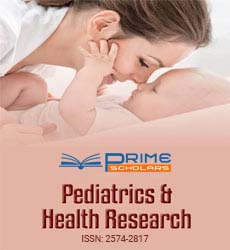Perspective - (2022) Volume 7, Issue 6
Evaluation of the Pediatric Life Support Instructors Courses and Cardiovascular Health in Pediatric Heart Transplant Patients
Carmel Bogle*
Department of Bioengineering, University of California, USA
*Correspondence:
Carmel Bogle,
Department of Bioengineering, University of California,
USA,
Tel: 7698325479,
Email:
Received: 31-Oct-2022, Manuscript No. IPPHR-22-15156;
Editor assigned: 02-Nov-2022, Pre QC No. IPPHR-22-15156 (PQ);
Reviewed: 16-Nov-2022, QC No. IPPHR-22-15156;
Revised: 21-Nov-2022, Manuscript No. IPPHR-22-15156 (R);
Published:
28-Nov-2022, DOI: 10.36648/2574-2817-7.6.51
INTRODUCTION
In the pediatric setting, health research is increasingly focused
on preventing long-term disease progression and supporting
maintenance processes that are now critical in the management
of fully advanced disease. Most children who are hospitalized
or affected by ongoing illness may benefit from clear
and careful consideration regarding nutrition. Affecting bodily
functions, all of which together have a profound effect on promoting
well-being and destiny, all being equal. To gain more
experience with metabolic cycles and how they relate to nutrition
and health, nutrition and metabolomics have been combined
to produce current advances in metabolic assessment.
Specifically, nutritionists are assessing the metabolomic way to
deal with lay out the single wholesome aggregates, that is to
say, the manner by which diet interfaces with people’s digestion
systems. This methodology offers the chance of giving a
total meaning of the person’s nourishing and wellbeing status,
foresee the gamble of illness, and make metabolomic data sets
supporting the improvement of “customized sustenance,” in
which diet is sensitive to the healthful requirements of individual
patients.
Description
Metabolomics, one of the latest sciences, can be characterized
as a methodology in view of the precise investigation of the total
arrangement of metabolites present in a given natural framework,
whether liquids, cells, or life forms The metabolome addresses
the total arrangement of low sub-atomic weight metabolites
created by an organic entity, which are the finished
results of quality articulation. Subsequently, it tends to be seen
as a mirror that mirrors the physiological, transformative, and
neurotic condition of an organic framework. By estimating the
metabolome, metabolomics permits us to photo the genome in its collaboration with the climate and consequently examine
the metabolic status of a living being in resolved physiological
circumstances as a result of medication treatment, ecological
impacts, sustenance, way of life, hereditary impacts, etc. Metabolomics
research can typically be delegated in a targeted or
untargeted manner.
Conclusion
Certain assays are focused on representing a particular class of
metabolites and are used to deterministically measure a certain
number of known metabolite groupings. This approach is
important for investigating the behavior of specific collections
of sample mixtures under specific conditions. Untargeted Metabolomics
focuses on examining and fingerprinting metabolome
profiles without the need to identify or accurately score
each metabolite in the sample. This approach is most useful for
biomarker disclosure, diagnosis, and discovery of overt metabolic
disease instances. Investigation of complex metabolic
fingerprints and similar investigations of the metabolome are
performed by a combined methodology of spectroscopy and
spectroscopy and programs. A regularly used method is atomically
fascinating reverberation. Procalcitonin is a small subatomic
peptide that is widely advocated as a supportive symptom
marker for infections in the adult population. Consensus
evidence for the use of procalcitonin in the pediatric population
is arguably not perfect. Our aim is to review the ongoing
evidence for the use of procalcitonin in children in a variety of
clinical settings, including sepsis use and injury and to distinguish
existing information gaps. Antiphospholipid syndrome is
one type of immunological diseases which may be primary or
secondary characterized by repeated thrombosis. Although a
well-known disease in gynecology, there is no sufficient data
in pediatrics field; so we see that it is important to discuss this
interesting case.
Citation: Bogle C (2022) Evaluation of the Pediatric Life Support Instructors Courses and Cardiovascular Health in Pediatric Heart Transplant Patients. Pediatr Heal Res. 7:51.
Copyright: © 2022 Bogle C. This is an open-access article distributed under the terms of the Creative Commons Attribution License, which permits unrestricted use, distribution, and reproduction in any medium, provided the original author and source are credited.
